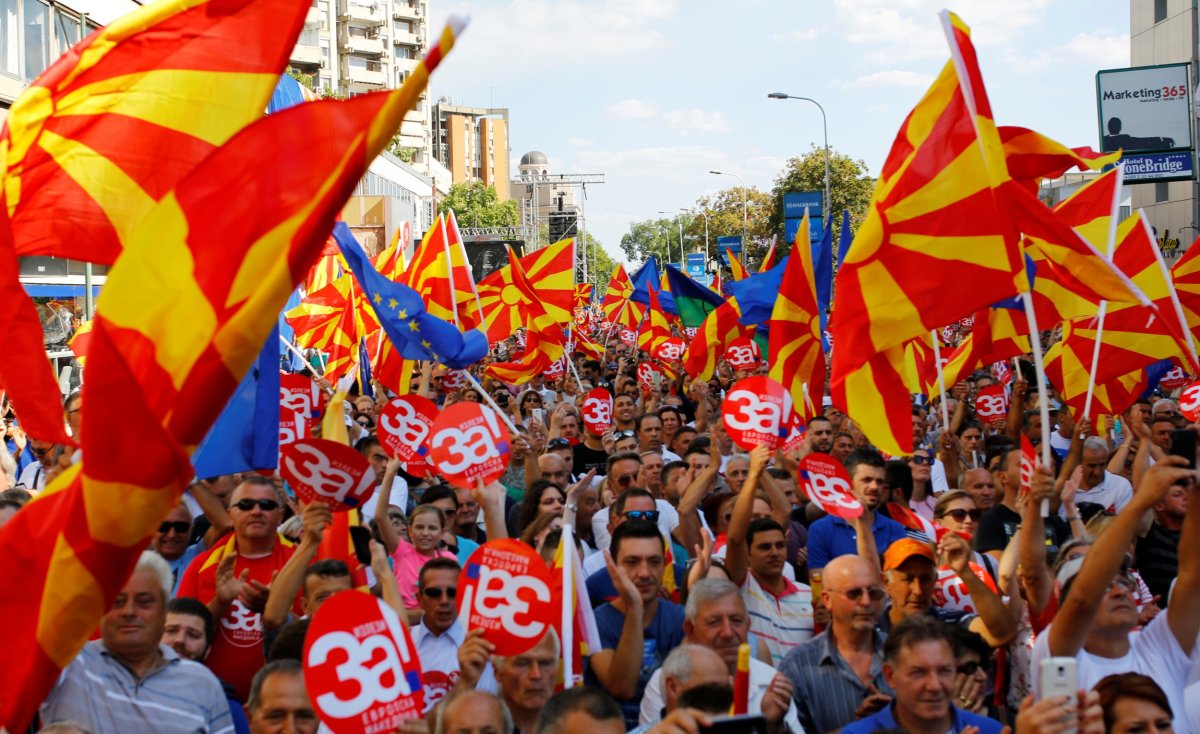Macedonians will go to the polls Sunday for a referendum that could mark the beginning of the young nation's acceptance into some of the most powerful international blocs in the world.
Macedonia has been caught in a naming dispute with neighboring Greece since gaining its independence from Yugoslavia in 1991. Athens has blocked Macedonian entry into both the European Union (EU) and NATO on this basis, leaving the small nation diplomatically and economically isolated.
The grievance comes from the fact Macedonia shares its name with a northern Greek province. Athens argues that by maintaining the same name, leaders in Skopje tacitly claim the Greek region.
Both Macedonias were once part of a Roman province of the same name and each claims the heritage of the legendary Alexander the Great, who established one of the largest empires in world history.
The two nations have now agreed on a solution after decades of wrangling. If given the support of the electorate, Skopje will officially adopt the name of Republic of North Macedonia. It will replace the current full country name of Former Yugoslav Republic of Macedonia.
Prime Minister Zoran Zaev is hoping he can win the day. The referendum will answer only one question: "Are you in favour of European Union and Nato membership by accepting the agreement between the Republic of Macedonia and the Republic of Greece?"
According to Reuters, Zaev expects the country to back the agreement, setting the stage for North Macedonia to join NATO next spring once the Skopje assembly ratifies the deal.

A poll conducted by the country's Telma TV station found that 57 percent of the 1.8 million voters intend to head to the polls Sunday, of whom 70 percent said they will back the name change.
A yes vote would bring to an end almost three decades of animosity between the neighbors that has resulted in clashes both serious and farcical. After Greece blocked Macedonia's 2008 NATO application and squashed its EU hopes, for example, Skopje began building statues of greek heroes—including Alexander—across the capital.
Supporters say the country desperately needs access to the protection and investment offered by NATO and EU membership. The country's economy is in dire straits following a two-year financial crisis that sent unemployment rocketing to around 20 percent. The average monthly salary in the Balkan nation is just $411, the lowest in the region, Reuters said.
Macedonia's economy stalled last year on the back of a two-year financial crisis with unemployment exceeding 20 percent, one of the highest rates in the Balkans, and an average monthly net salary of 350 euros ($411), the lowest in the region.
Zaev told the BBC that joining NATO and the EU is vital for the country to develop. "We don't change our name because we want to do it," he explained. "We do it because of our future in the EU and Nato. Everyone is aware why we do it."
The turnout must exceed 50 percent to be valid. But nationalist groups—including the United Macedonia party which has links to Russian President Vladimir Putin's United Russia party—are boycotting the vote in opposition of the name change, hoping to invalidate the expected government victory.
Analysis by the Transatlantic Commission on Election Integrity (TCEI) revealed a high number of new accounts spreading nationalist propaganda on Twitter and Facebook. The organization said automated accounts were "behind an effort to suppress voter turnout."
The TCEI noted that new accounts younger than 60 days old make up around 10 percent of online discussion on the topic. This is a larger proportion that was seen in Mexico's July election and more than three times that in the recent Italian vote—countries with far higher populations.
U.S. Secretary of Defense Jim Mattis has said Russia is meddling in the referendum, though Russian Foreign Minister Sergei Lavrov denied the allegations.
If turnout is above 50 percent and the majority vote for the name change, the bill will go to Macedonia's national assembly, which will have to pass the change by a two-thirds majority.
Then, finally, it will need to be ratified by the Greek parliament. The ruling coalition is fractured, meaning there is no guarantee they will follow Prime Minister Alexis Tsipras' order to approve the agreement.
Obstacles abound, but Sunday may well see the beginning of a whole new era for Macedonia, or rather North Macedonia.
Uncommon Knowledge
Newsweek is committed to challenging conventional wisdom and finding connections in the search for common ground.
Newsweek is committed to challenging conventional wisdom and finding connections in the search for common ground.
About the writer
David Brennan is Newsweek's Diplomatic Correspondent covering world politics and conflicts from London with a focus on NATO, the European ... Read more
To read how Newsweek uses AI as a newsroom tool, Click here.








